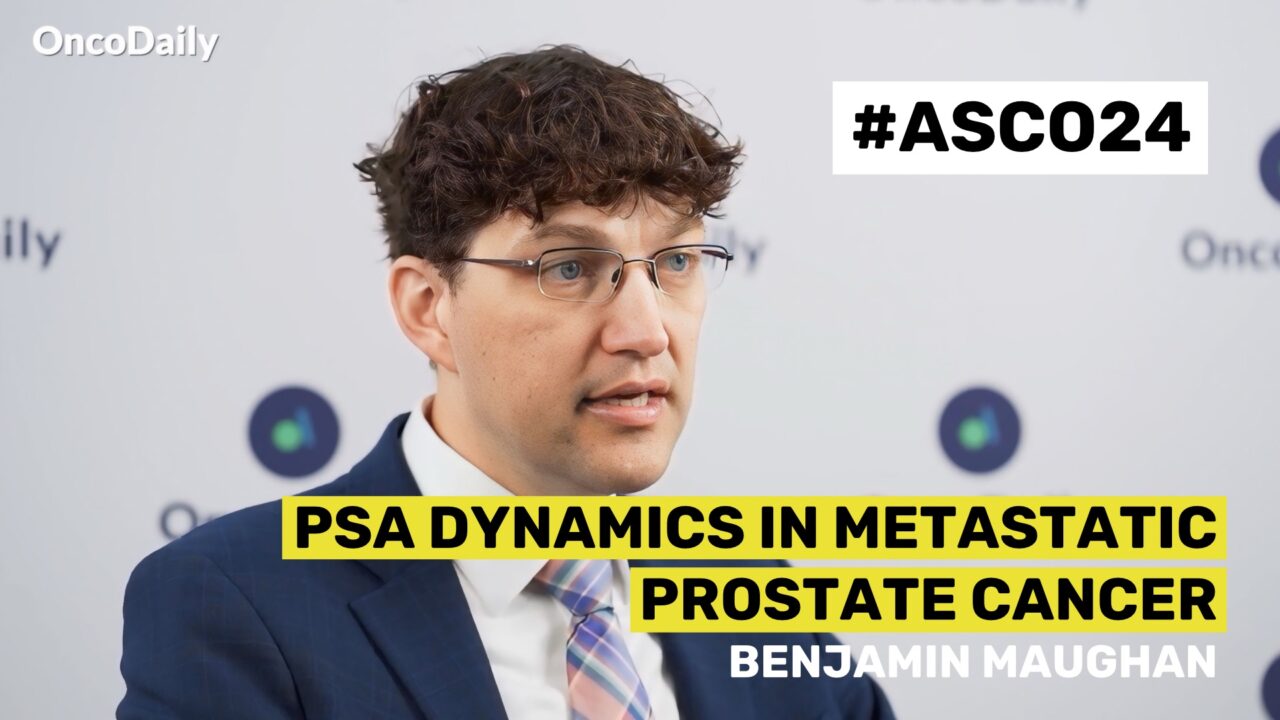The American Society of Clinical Oncology (ASCO) Annual Meeting is one of the largest and most prestigious conferences in the field of oncology. This year, the meeting took place from May 31 to June 4 in Chicago, Illinois. The event gathers oncologists, researchers, and healthcare professionals from around the world to discuss the latest advancements in cancer research, treatment, and patient care. Keynote sessions, research presentations, and panel discussions are typically part of the agenda, providing attendees with valuable insights into emerging trends and innovations in oncology.
This year, OncoDaily was at ASCO 2024 for the first time covering the meeting on-site. We had the pleasure of interviewing researchers who summarized the highlights of their work.
In this video, Dr. Benjamin Maughan, genitourinary oncologist at Huntsman Cancer Center, shared insights on ‘Rapid and deep prostate-specific antigen (PSA) response to apalutamide plus ADT and survival in metastatic castration-sensitive prostate cancer (mCSPC) in real world practice in the US (OASIS Project).‘
Hello, my name is Benjamin Maughan. I’m a genitourinary medical oncologist at the Huntsman Cancer Center in Salt Lake City, Utah at the University of Utah. I had the privilege of participating in a study where we were looking at a real-world data set to interrogate the experience for patients treated with intensified therapy that had metastatic hormone sensitive prostate cancer.
So there’s been a lot of previous research from prospective clinical trials, like LATITUDE, CHARTED, TITAN, others, showing that in clinical trial patients, the early PSA response was a strong predictor of overall survival for these patients. So what we were trying to replicate is to see if the PSA dynamics, the early PSA response to those dynamics, also predict overall survival in patients in a real-world data set. Oftentimes, real-world data is not as effective, for instance, or perhaps sometimes is shown to be more toxic than what is observed in prospective clinical trials.
So again, we wanted to determine if this robustness of PSA kinetics played out in this real-world data set. And in this CONCERT-AI real-world data set, we were looking at specifically the response from ADT plus apalutamide. The reason that we picked this combination is that we had a prospective clinical trial that we could sort of compare or benchmark the results against.
So in this clinical trial, or excuse me, in the clinical trial of TITAN, again, we saw that the PSA kinetics, i.e. does an undetectable PSA at three months predict overall survival? And it does. So in our real-world data set, we followed the exact same time frame. We looked at the three-month time frame for patients that achieved an undetectable PSA compared to those patients who did not, at any time point, achieve an undetectable PSA.
And the hazard ratio was strongly in favor of an undetectable PSA being a good or favorable prognostic indicator. We also looked at a third group of patients that, at some time point later than three months, achieved an undetectable PSA. And these patients also had a much more favorable prognosis than patients who never achieved an undetectable PSA.
So again, even in a real-world data set, PSA kinetics are strongly predictive of overall survival. Interestingly, for me, one of the most interesting findings is that the overall survival results were identical to what we saw in the clinical trial population. And so this suggests to me that this combination is very effective and useful.
And even in patients that are more frail or that have more comorbidities, et cetera. And again, the PSA kinetics also give us a good indication of eventual overall survival response.
More videos and content from ASCO 2024 on OncoDaily.


